
Why Elite Private Schools Embrace AI While Public Schools Restrict It?
Here's what your college counselor won't tell you: while public schools are locking down ChatGPT like it's digital contraband, elite private schools are handing out AI tools like candy at orientation. The education gap isn't just widening—it's becoming a canyon, and the bridge costs $50,000 a year in tuition.
This isn't about whether AI is good or bad for education. That debate is already over. The winners have been decided, and they're sitting in classrooms where Phillips Exeter Academy students build AI models for their senior projects while public school kids get detention for asking ChatGPT a homework question.
$50,000 Question Nobody's Asking
Walk into Nueva School in Hillsborough, California, where tuition runs $55,050 annually, and you'll find students collaborating with AI tutors, creating machine learning projects, and learning to code alongside ChatGPT. Drive 20 minutes to any public school in the same area, and teachers are installing browser blockers faster than you can say "academic integrity violation."
The disparity is brutal and it's deliberate. While Carnegie Mellon University admits that blanket AI bans are "not a viable policy," most public schools are still treating AI like it's 2022 and ChatGPT just launched. Meanwhile, at Sidwell Friends in D.C.—where tuition hits $48,050—students learn AI literacy as part of their core curriculum.
Here's the kicker: research from the Center on Reinventing Public Education shows that suburban, majority-white, and low-poverty school districts are currently twice as likely to provide AI training for their teachers than urban, rural, or high-poverty districts. That's not a technology gap—that's educational apartheid with a silicon chip.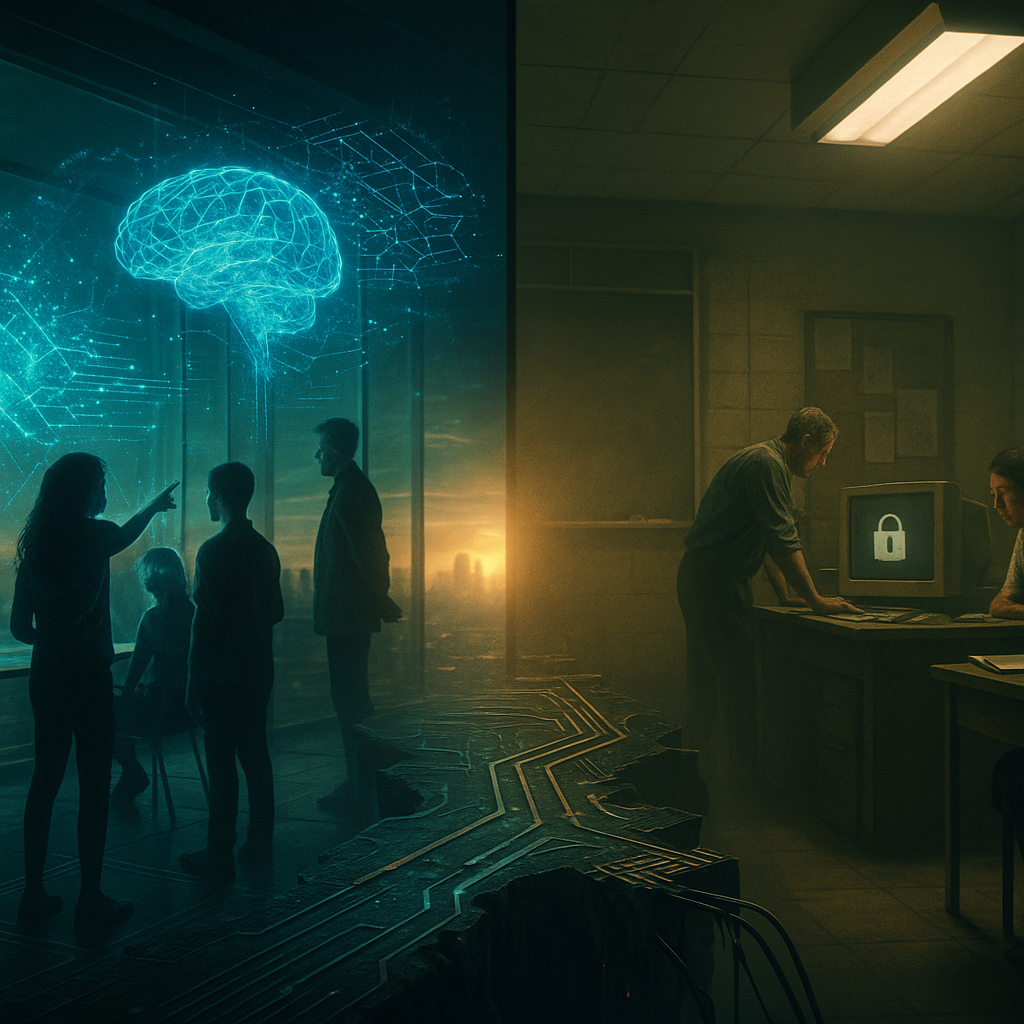
The Private School Playbook: Turning AI Into Academic Rocket Fuel
Elite private schools aren't just allowing AI—they're weaponizing it for their students' advantage. At Phillips Exeter, students aren't learning about AI; they're building it. Sofiya Goncharova '25 created an entire podcast series exploring AI's impact on society as her senior project. Her peers use neural networks for research projects that would make college professors sweat.
Alpha Schools, the new AI-driven private school network expanding across eight states, takes it further. Students spend just two hours on AI-personalized core academics, then devote the rest of their day to real-world skills. With tuition starting at $40,000, they're promising what public schools can't: complete educational transformation powered by artificial intelligence.
The teachers—sorry, "guides"—at Alpha Schools start at $100,000 salaries. They don't create lesson plans because AI does that. They coach, motivate, and facilitate while algorithms handle the heavy lifting of personalized education. Public school teachers making $45,000? They're still photocopying worksheets from 1987.
Khan Academy's founder Sal Khan has gone all-in with Khanmigo, their AI teaching assistant. Private schools are licensing it en masse. Public schools? They're still debating whether calculators make kids lazy at math.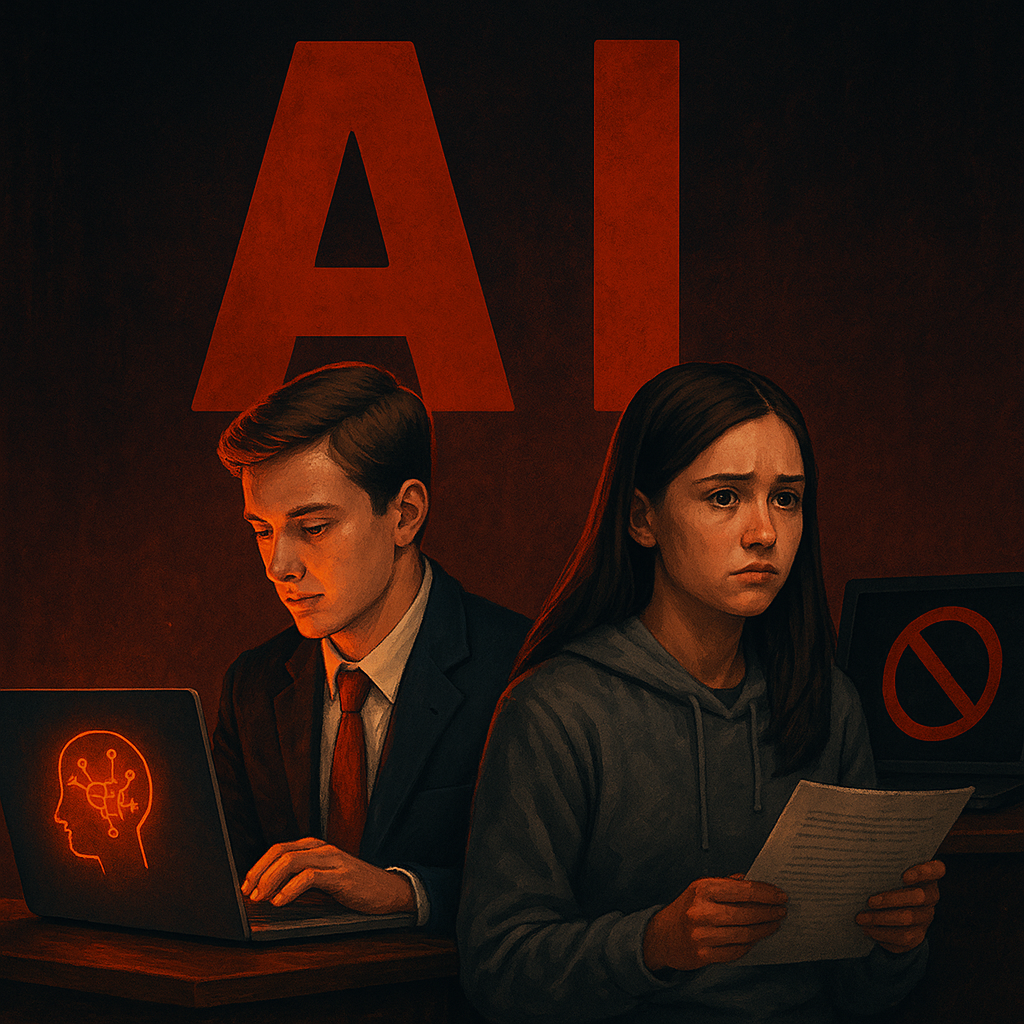
Public Schools: Where Innovation Goes to Die
Here's what's actually happening in public schools: panic, paralysis, and policy theater. New York City Public Schools initially banned ChatGPT, then backtracked when they realized they looked like digital dinosaurs. But the damage was done—the message was clear: AI is the enemy.
According to recent studies, 81% of teachers say they're overworked. You know what could help? AI assistants handling paperwork, creating personalized lesson plans, and providing instant feedback to students. But instead of embracing these tools, public schools are forcing teachers to become prison guards, monitoring screens and hunting for AI-generated essays like it's CSI: Homework Edition.
Casey Cuny, California's 2024 Teacher of the Year, admits the reality: "Anything you send home, you have to assume is being AI'ed." So what's his solution? Force all writing to happen in class under surveillance. That's not education—that's educational imprisonment.
The irony burns: public school teachers spend their evenings creating lesson plans while AI could do it in seconds. They grade papers until midnight while AI could provide instant, detailed feedback. They struggle to differentiate instruction for 30 students while AI could create personalized learning paths for each kid. But no—we must protect the sanctity of traditional education, even if it means burning out teachers and boring students to death.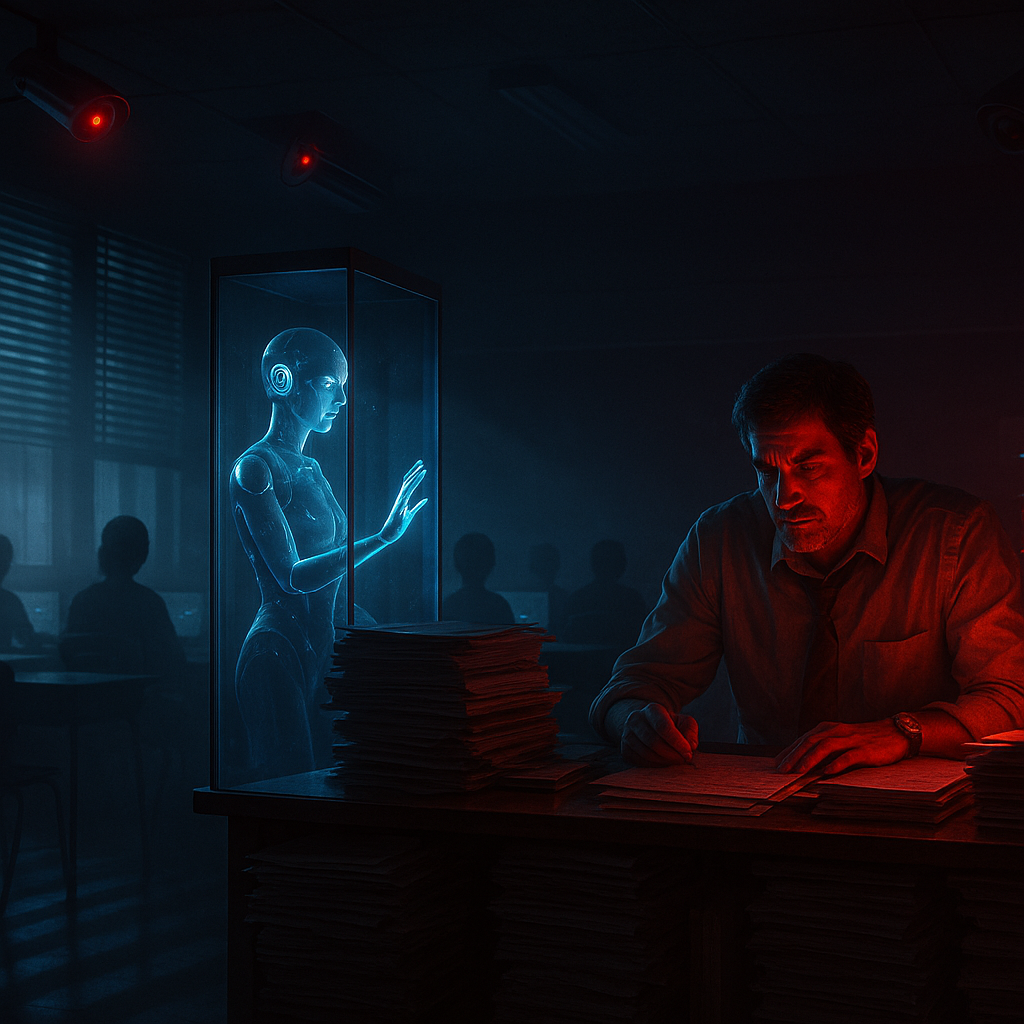
The Real Cost of This Divide
Let's talk money, because that's what this is really about. Private schools charging $50,000+ annually aren't just buying smaller class sizes—they're buying the future. When Harvard-Westlake students graduate with four years of AI collaboration under their belts, and public school graduates have four years of being told AI is cheating, who do you think wins in the job market?
The RAND Corporation's research reveals that 183 healthcare systems have already adopted AI applications. Finance runs on algorithms. Tech companies assume AI literacy. Yet we're sending public school kids into this world with the digital equivalent of bringing a knife to a drone fight.
Phillips Exeter Academy alumni like Jimmy Lin '97 are leading AI research globally, building the next generation of machine learning systems. Their advantage didn't start in college—it started in high school computer science classes where AI wasn't banned but embraced. Meanwhile, public school students get their first real AI exposure in college, already four years behind their private school peers.
The wealth gap in education isn't new, but AI is pouring gasoline on it. When one kid learns to collaborate with AI from age 10 and another is taught to fear it until 18, we're not talking about an education gap—we're engineering a caste system.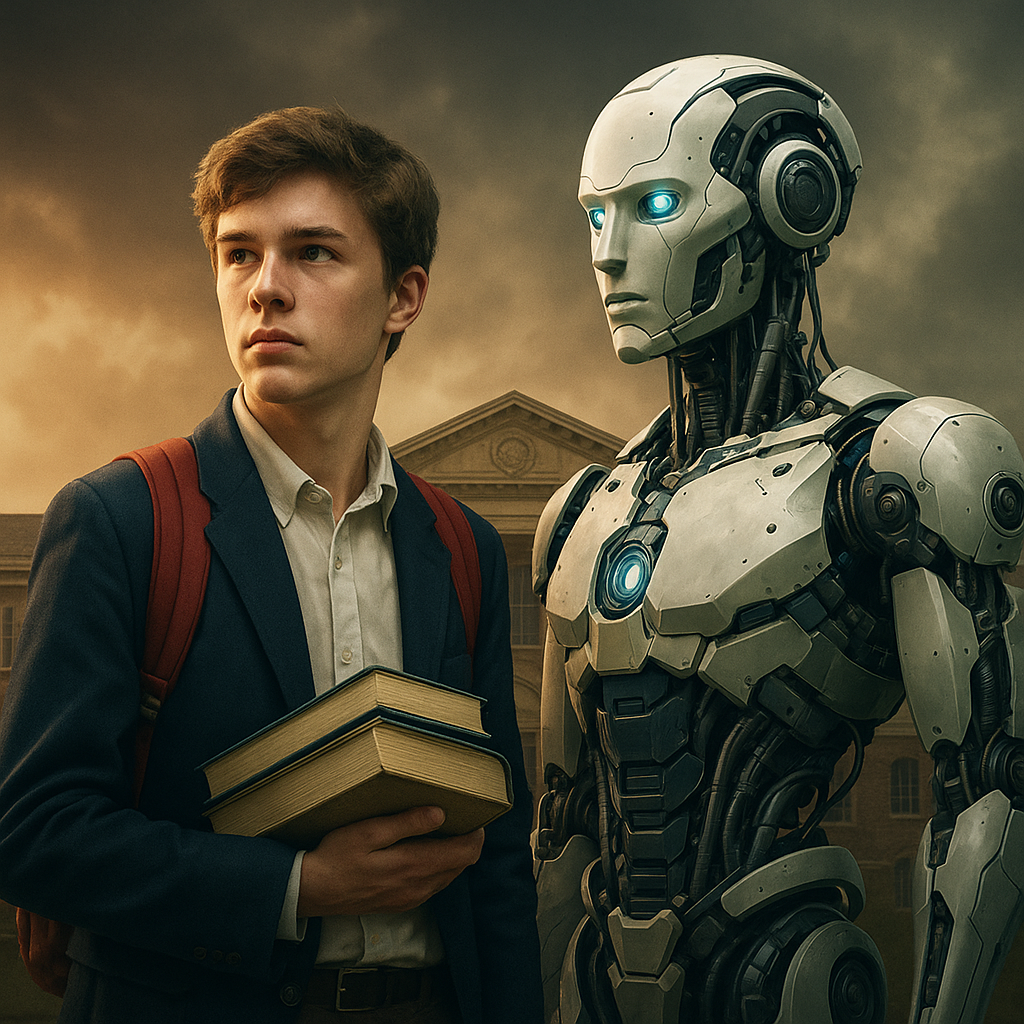
Why Private Schools Get It (And Public Schools Don't)
Private schools can pivot because they answer to parents who pay $50,000 checks, not bureaucrats who fear headlines. When parents at Nueva School demand AI integration, it happens by next semester. When parents at public schools ask about AI, they get a 47-page policy document about academic integrity.
Private schools also have something public schools desperately lack: trust in their students. They believe kids can handle powerful tools responsibly. Public schools treat students like potential criminals who'll cheat at the first opportunity. Guess which mindset produces innovation?
The teacher quality gap matters too. Private school "guides" at Alpha Schools make six figures to facilitate AI-powered learning. Public school teachers make half that to actively fight against AI. One group sees AI as a teaching assistant; the other sees it as a threat to their existence
Ryne AI Reality Check
While administrators panic about AI detection, students are already three steps ahead. They're using Ryne Chat to draft essays that sound exactly like them. They're running their work through Essay Composer to structure arguments their teachers can't distinguish from "authentic" writing. They don't need permission — they need results.
Private school kids get AI training baked into their premium education. Public school students? They get threatened with academic dishonesty charges. So they turn to Ryne. Our Chat doesn't just answer questions — it teaches you how to think with AI. Our Essay Composer doesn't write for you — it shows you how the best writers structure killer arguments. This is the education system's dirty secret: the kids using our tools aren't cheating. They're learning the actual skills that matter.
When rich kids learn prompt engineering while poor kids get detention for using ChatGPT, the system isn't protecting integrity. It's protecting privilege. Ryne Chat and Essay Composer aren't just tools — they're the equalizers. Master them now, or get left behind by those who did.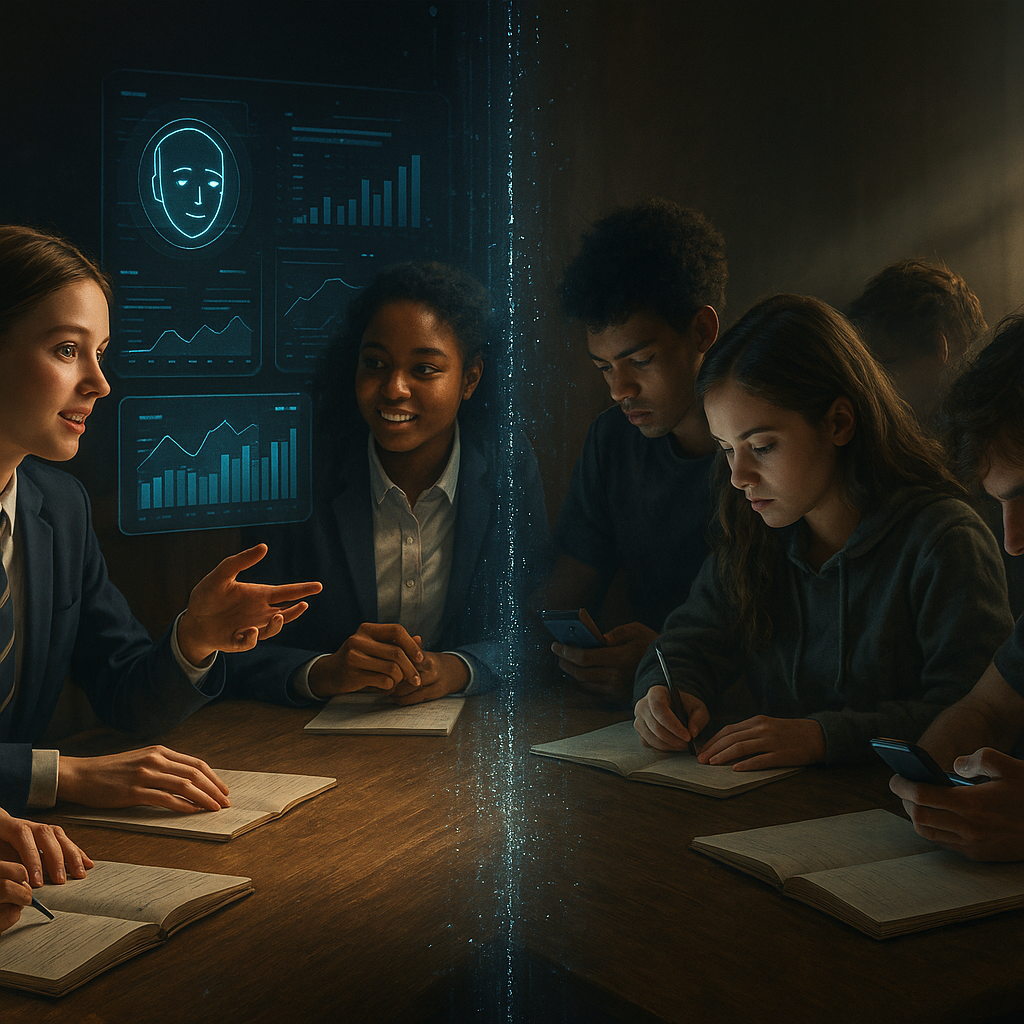
The Solutions Nobody Wants to Hear
First, public schools need to stop treating AI like it's plutonium. UC Berkeley's guidance to faculty is clear: "In the absence of clear AI policy, students will use these technologies inappropriately." The solution isn't banning—it's teaching responsible use.
Second, we need to fund public school AI training immediately. South Korea and Singapore are rolling out national teacher-training programs for AI integration. America? We're still arguing about whether spell-check counts as cheating.
Third, accept that the essay is dead. The take-home test is extinct. The book report is fossilized. Instead of mourning these relics, create new assessments that assume AI exists. Private schools are already doing this—public schools are still assigning five-paragraph essays like it's 1995.
Fourth, democratize AI tools for all students. If private schools can afford Khanmigo and personalized AI tutors, public schools need free alternatives. This isn't optional—it's educational justice.
The Future Is Already Here—It's Just Expensive
By 2027, the students graduating from elite private schools will have spent their entire high school careers collaborating with AI. They'll enter colleges and workplaces where AI integration is assumed, not taught. Public school graduates will arrive needing remedial AI literacy courses, already behind before they start.
This isn't speculation—it's mathematics. When one group practices with professional tools for four years while another group is banned from touching them, the outcome is predetermined. We're watching educational segregation happen in real-time, measured not in separate water fountains but in access to artificial intelligence.
The most insidious part? This gap is invisible to most people. Parents assume all schools are handling AI similarly. They're not. While Exeter students build AI models, public school students write essays by hand to avoid cheating accusations. While Sidwell Friends integrates AI across curricula, public schools lock down laptops like minimum-security prisons.)
Your Move
The education system won't fix itself. Bureaucrats won't suddenly develop courage. Teachers unions won't champion AI integration tomorrow. If you're a student in a public school, you have two choices: wait for the system to catch up (spoiler: it won't) or take control of your own AI education.
Use Ryne AI humanizer to level the playing field. Learn prompt engineering on YouTube. Practice with ChatGPT even if your school forbids it—especially if your school forbids it. The private school kids aren't waiting for permission to prepare for the future. Neither should you.
If you're a parent, start asking uncomfortable questions at school board meetings. Why are private schools teaching AI while public schools ban it? Why are we preparing students for a world that no longer exists? Why are we accepting this divide?
The brutal truth: education inequality has always existed, but AI is the accelerant that will make it irreversible. Private schools understand this. They're not debating whether to adopt AI—they're competing on who implements it best. Public schools are still asking whether students should be allowed to use spell-check.
The game is rigged, but now you know the rules. Private school kids get AI training, personalized tutors, and machine learning projects. Public school kids get detention for using ChatGPT. That's not education—that's educational malpractice.
Stop waiting for permission to prepare for the future. The private school kids already have a four-year head start. The question isn't whether you'll use AI in your education—it's whether you'll do it with school support or despite school prohibition. Choose wisely. Your future depends on it.
For students navigating this AI divide and needing to work within restrictive school policies, Ryne humanizer helps bridge the gap between AI assistance and academic requirements. Because waiting for the education system to catch up isn't a strategy—it's surrender.

Hix AI Review: Smart Assistant or Subscription Scented Mirage?
You've seen the ads. You've heard the promises. "Bypass any AI detector with 99% success rate!" HIX AI swears they've cracked the code. They claim their tool makes AI writing completely undetectable. They position themselves as your academic savior, the ultimate workaround to beat Turnitin and every other detection system. Here's what they don't tell you: It's all smoke and mirrors. And today, we're pulling back the curtain.

Is AI Making Professors Obsolete?
Your professor isn't teaching you anymore—ChatGPT is. While universities pretend everything's fine, 92% of students are already using AI tools for their coursework. Not 50%. Not 75%. Ninety-two percent. And here's the kicker: students using ChatGPT with fake professor personas rate the AI higher in teaching clarity and competence than actual human professors. Let's cut through the academic theater and face what's actually happening in classrooms worldwide. Because while professors clutch their tenure and administrators count tuition dollars, students have already voted with their keyboards.

